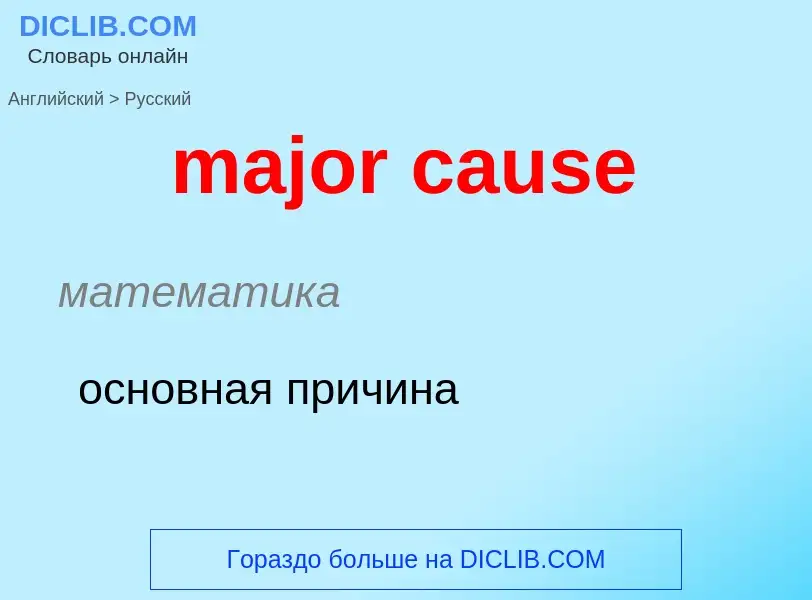Μετάφραση και ανάλυση λέξεων από τεχνητή νοημοσύνη
Σε αυτήν τη σελίδα μπορείτε να λάβετε μια λεπτομερή ανάλυση μιας λέξης ή μιας φράσης, η οποία δημιουργήθηκε χρησιμοποιώντας το ChatGPT, την καλύτερη τεχνολογία τεχνητής νοημοσύνης μέχρι σήμερα:
- πώς χρησιμοποιείται η λέξη
- συχνότητα χρήσης
- χρησιμοποιείται πιο συχνά στον προφορικό ή γραπτό λόγο
- επιλογές μετάφρασης λέξεων
- παραδείγματα χρήσης (πολλές φράσεις με μετάφραση)
- ετυμολογία
major cause - translation to ρωσικά
математика
основная причина
существительное
общая лексика
майор
синоним
['meɪdʒə]
общая лексика
майор (младшее воинское звание в категории старшего офицерского состава сухопутных войск; воинское звание в категории старшего офицерского состава морской пехоты, соответствующее подполковнику сухопутных войск)
более важный
больший
большой
главный
мажорный
основной
сквозной
старший
юриспруденция
совершеннолетний (достигший 18 лет, до 1970-21 года)
старший (из двух или трёх братьев, а тж. второй из четырёх братьев - учащихся привилегированной частной средней школы [public school] или приготовительной школы [preparatory school]; ставится после фамилии, напр., Smith major или Smith ma.)
синоним
Смотрите также
прилагательное
['meidʒə]
общая лексика
больший
более важный
значительный
главный
крупный
относящийся к большинству
старший (ставится после фамилии старшего брата или старшего однофамильца, если они учатся в одной школе - в Великобритании)
больший, более важный
старший
юриспруденция
совершеннолетний
музыка
мажорный
большой (об интервале)
существительное
['meidʒə]
общая лексика
майор
обыкн. большая нефтяная компания
юриспруденция
совершеннолетний
логика
большая посылка (силлогизма)
главная посылка (в силлогизме)
музыка
мажор
американизм
главный
основной предмет специализации (в колледже)
профилирующая дисциплина (в колледже)
спорт
команда высшей лиги
глагол
американизм
специализироваться (о студенте)
специализироваться по какому-л. предмету (в колледже)
Ορισμός
Βικιπαίδεια
In United States criminal law, probable cause is the standard by which police authorities have reason to obtain a warrant for the arrest of a suspected criminal or the issuing of a search warrant. There is no universally accepted definition or formulation for probable cause. One traditional definition, which comes from the U.S. Supreme Court's 1964 decision Beck v. Ohio, is when "whether at [the moment of arrest] the facts and circumstances within [an officer's] knowledge and of which they had reasonably trustworthy information [are] sufficient to warrant a prudent [person] in believing that [a suspect] had committed or was committing an offense."
It is also the standard by which grand juries issue criminal indictments. The principle behind the standard is to limit the power of authorities to perform random or abusive searches (unlawful search and seizure), and to promote lawful evidence gathering and procedural form during criminal arrest and prosecution. The standard also applies to personal or property searches.
The term comes from the Fourth Amendment of the United States Constitution:
The right of the people to be secure in their persons, houses, papers, and effects, against unreasonable searches and seizures, shall not be violated, and no Warrants shall issue, but upon probable cause, supported by Oath or affirmation, and particularly describing the place to be searched, and the persons or things to be seized.
Probable in this case may relate to statistical probability or to a general standard of common behavior and customs. The context of the word probable here is not exclusive to community standards, and could partially derive from its use in formal mathematical statistics as some have suggested; but cf. probō, Latin etymology.
In U.S. immigration proceedings, the “reason to believe” standard has been interpreted as equivalent to probable cause.
Probable cause should not be confused with reasonable suspicion, which is the required criteria to perform a Terry stop in the United States of America. The criteria for reasonable suspicion are less strict than those for probable cause.


![The first page of the [[Constitution of the United States]] The first page of the [[Constitution of the United States]]](https://commons.wikimedia.org/wiki/Special:FilePath/Constitution of the United States WDL2708.jpg?width=200)
![Brazil]]}} Brazil]]}}](https://commons.wikimedia.org/wiki/Special:FilePath/Major Exército-V.gif?width=200)
![[[Canada]]}} [[Canada]]}}](Cdn-Army-Maj(OF-3)-2014 - Copy.svg)
![[[Estonia]]}} [[Estonia]]}}](https://commons.wikimedia.org/wiki/Special:FilePath/ES-Army-OF3.png?width=200)
![Georgia]]}} Georgia]]}}](https://commons.wikimedia.org/wiki/Special:FilePath/Georgia Army OF-4.png?width=200)
![[[Iran]]}} [[Iran]]}}](https://commons.wikimedia.org/wiki/Special:FilePath/Sargord.png?width=200)
![[[Malaysia]]}} [[Malaysia]]}}](https://commons.wikimedia.org/wiki/Special:FilePath/Major of Malaysian Army.png?width=200)
![[[Romania]]}} [[Romania]]}}](https://commons.wikimedia.org/wiki/Special:FilePath/RO-Army-OF3.png?width=200)
![[[Sweden]]}} [[Sweden]]}}](https://commons.wikimedia.org/wiki/Special:FilePath/OF-3 Major.jpg?width=200)
![Brazil]]}} Brazil]]}}](https://commons.wikimedia.org/wiki/Special:FilePath/Major-vertical fab.gif?width=200)






